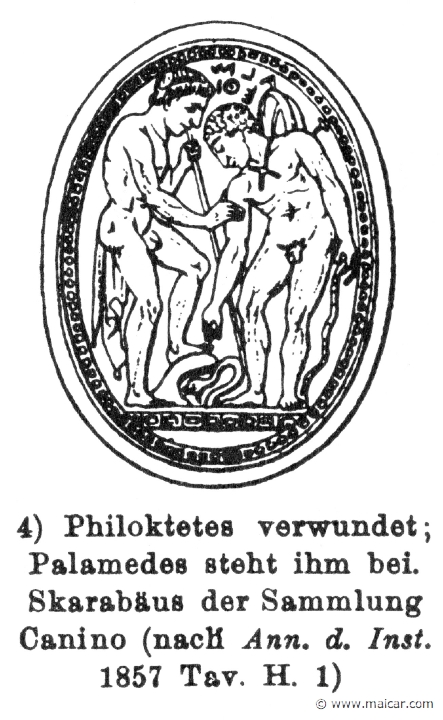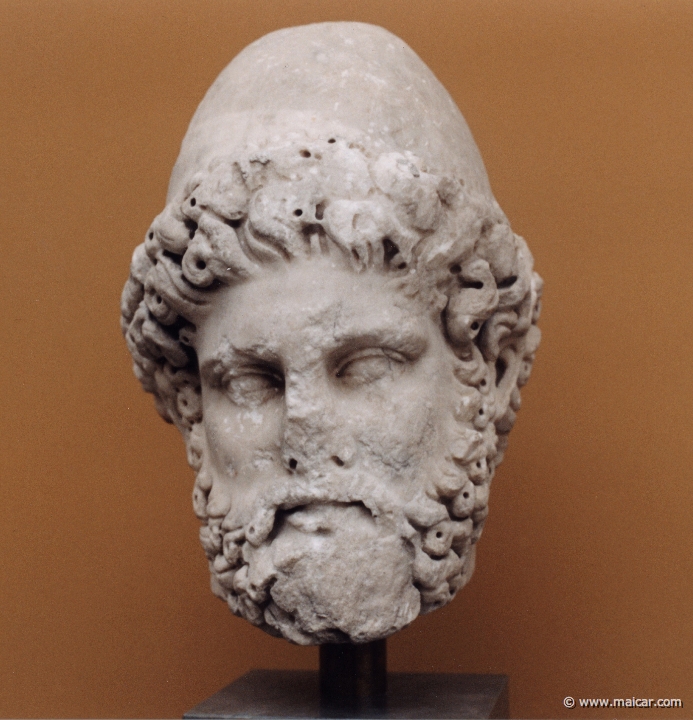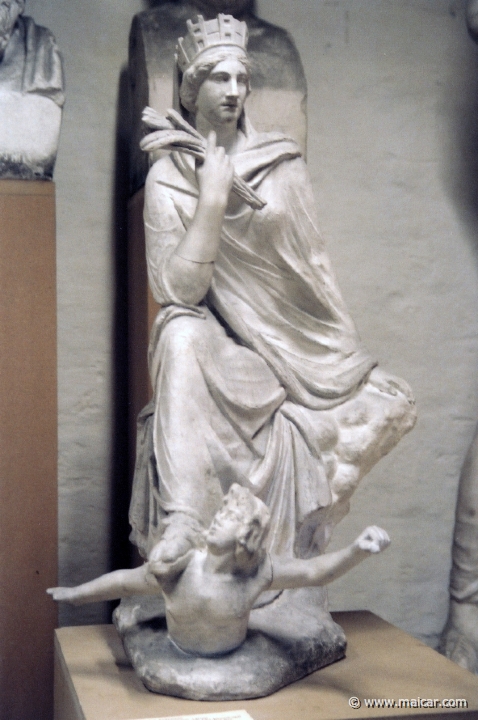|

|
RIII.2-2331b: Philoctetes wounded, and Palamedes. Wilhelm Heinrich Roscher (Göttingen, 1845- Dresden, 1923), Ausfürliches Lexikon der griechisches und römisches Mythologie, 1884.
|
|
|
"Palamedes found his
bitterest enemies in Odysseus and Homer; for the one laid an
ambush against him of people by whom he was stoned
to death, while the other denied him any place in
his Epic." (Flavius Philostratus, Life
of Apollonius of Tyana 3.22).
|
|
Palamedes, inventor of the dice and of several
letters of the alphabet, outwitted Odysseus, making him
join the expedition against Troy. But Odysseus became hostile to him, and Palamedes' cleverness proved fatal to himself.
Palamedes and knowledge
The contributions of Palamedes to knowledge were of such a nature that they have been named together with those made by the Egyptians and the Phoenicians. For the Egyptians, they say, were the first to
represent thought by symbols and pictures of
animals. These symbols are among the most ancient,
and having being impressed upon stone, they are
still visible today. And some have believed that
the Phoenicians took the idea of the alphabet from
the Egyptians and then imported it into Hellas,
being as they were predominant at sea. For it was Cadmus, they say, who
taught the art of writing to the uncivilised
Greeks, having arrived with a Phoenician fleet.
Many letters invented by Palamedes
King Cecrops 1 of Athens has been also
counted among those who promoted civilization. But
during the time of the Trojan War, Palamedes
of Argos was one of the
most brilliant, having invented eleven letters of
the alphabet or, as others say, sixteen.
What this knowledge lacks
Now, it has been remarked, that this kind of
knowledge, which is good in the sense that it
provides various skills, is not enough in order to
learn what may be of real advantage for each person
and for the community. For lawful, just, and
harmonious life in social and political relations
has never been learned, and instead wronging and
plotting against one another has often prevailed
with terrible results even for men of knowledge.
Knowledge did not save Palamedes
And in the same way as power and wealth did not save Agamemnon from being murdered, or Oedipus from falling into utter ruin, knowledge and the invention of the letters could not save Palamedes from being stoned by the same men whom he had instructed. For the Achaeans did not even know how to count the host, and when they had learned this from Palamedes and had themselves become clever and proficient, then they slew him.
The Oath of Tyndareus
Because of The Oath of Tyndareus, it was the
duty of many rulers in Hellas to join the coalition
that was being formed for the purpose of sailing to Troy and obtain, either by
words or by force, the restoration of Helen and the Spartan
property that had been stolen by the seducer Paris.
Odysseus' reasons to
avoid the war
When the envoys Palamedes, Menelaus, and Nestor, arrived to Ithaca
in order to remind Odysseus of the oath he
had sworn, and exhort him to join the expedition,
they met difficulties, for Odysseus had been
warned by an oracle that if he went to Troy he would return home
alone and in need, with his comrades lost, after
twenty years.
|

|
Odysseus, whom Palamedes outwitted, meant death to him. 1624: Odysseus. Copy of Greek work from IV c. BC. Ny Carlsberg Glyptotek, Copenhagen.
|
|
Palamedes is not tricked by Odysseus
That is why Odysseus, not wishing
to go to war, feigned madness. But Palamedes,
seeing through the deception, snatched little Telemachus, Odysseus' son, from Penelope's bosom, and
drew his sword, pretending that he would kill him.
So Odysseus, fearing for his son's life, confessed that his madness was fictitious, and accepted to go to war. But others say that when Odysseus learned that
spokesmen would come to him, he put on a cap and,
pretending madness, yoked a horse and an ox to the
plow. Palamedes, they say, noticing that Odysseus was performing
a farce, took his son Telemachus from the
cradle and put him in front of the plow, exhorting Odysseus to give up his
pretence. Then Odysseus promised to join the allies, but from that time he
was hostile to Palamedes, though The Oath of Tyndareus that bound
him had been Odysseus'
invention as well.
Odysseus plots
against Palamedes
Having come to the front at Troy, Odysseus, never
forgetting that he had been outwitted by Palamedes,
kept plotting night and day against him. It is told
that Odysseus compelled
a Trojan prisoner to write a letter of treasonable
purport, which seemed to be sent by King Priam 1 of Troy to Palamedes, and that he dropped the letter in the camp to be found and at the same time buried gold in the quarters of Palamedes. Others have said that Odysseus, referring to
a warning in a dream, convinced Agamemnon to move the
Achaean camp for one day, and hid by night a great
quantity of gold in the place where Palamedes' tent
had been. Odysseus also
gave to a Trojan prisoner a letter to be carried to
King Priam 1, and sent a
soldier of his ahead to kill him not far away from
the camp. So when the army returned the next day to
the camp, a soldier found the letter on the body of
the dead Trojan prisoner. And on it it was written:
"Sent to
Palamedes from Priam" (Hyginus, Fabulae 105).
… promising him as much gold as Odysseus had hidden if
he would betray the camp according to agreement.
Palamedes found guilty of treason
This is how Palamedes lost his life through an
unjust judgement. For the next day, when Palamedes
was brought before Agamemnon, he denied
having betrayed the army, but he was not able to
convince either the king or anyone else of his
innocence, after soldiers went to his tent and dug
up the gold that sly Odysseus had hidden.
Palamedes' death
And so Palamedes was stoned to death by the
entire army. But others affirm that there was not
such a plot, and that Palamedes was drowned by Odysseus and Diomedes 2 when he put
out to catch fish.
Ajax 1 recalls the
incident in Ithaca
|

|
Palamedes dedicated the dice he invented to Tyche, but the goddess did not protect him when he fell a victim of slander. 8820:'Tyche fra Antiochia'. Fra 'Villa Le Vignacce' i Rom. Eutykides. Graesk ca. 300 f. Kr. (Romkopi). Vatikanet, Galleria dei Candelabri. Royal Cast Collection, Copenhagen.
|
|
After Achilles'
death, when Ajax 1 and Odysseus competed for
his arms, the former recalled the circumstances
that forced Odysseus to
come to Troy to show the
judges that he was a better man and deserved the
arms of Achilles:
"Shall Odysseus appear the better man who came last to arms and by feigned madness shirked the war, till one more shrewd than he … the son of Nauplius, uncovered this timid fellow's trick and dragged him forth to the arms that he shunned ? Shall he take the best because he wanted to take none ? And shall I go unhonoured … just because I was the first to front the danger ?" (Ajax 1. Ovid, Metamorphoses 13.34).
Palamedes' father claims satisfaction
When Palamedes' father Nauplius 1 learned that calumny and a miscarriage of justice had killed his son, he sailed to the Troad, and meeting the leaders of the Achaean army, claimed satisfaction. But all of them favored Agamemnon, who
protected Odysseus, and so Nauplius 1 returned unsuccessful.
Revenge
Then Nauplius 1, avenging himself for the outrage he had suffered, traveled through the whole of Hellas and contrived that the wives of the ACHAEAN LEADERS should take lovers. And that is why, they say, Clytaemnestra slept with Aegisthus,
Aegialia, wife of Diomedes 2, with Cometes 2, and Meda 2, wife of King Idomeneus 1 of Crete, with Leucus 1. Because of this, Agamemnon was murdered
when he returned from Troy,
and Diomedes 2 and Idomeneus 1 had to go into exile. Besides, Nauplius 1 awaited the return of the Achaean fleet, and with the help of false beacon lights which he kindled in Mount Caphareus in the island of Euboea, he led many vessels against the rocks where they were wrecked and many men perished. For when Ajax 2 was wrecked by Athena for
what he had done to Cassandra, the other Achaeans implored at night the aid of the gods. On hearing their prayers, Nauplius 1 brought a torch to the place where the rocks were most sharp and the coast most dangerous. Then the Achaeans, believing that this was a sign of the mercy of the gods, steered their vessels to the place signalled by Nauplius 1. In that way many ships were dashed on the rocks, and many of the troops and their leaders perished. Those who, in spite of the storm and the shipwreck could swim to the shore were killed by Nauplius 1 (see also map: The Returns). Agamemnon did not
perish at cape Caphareus, for the wind bore him to
his own shores. But Oeax, in order to avenge the
wrong done to his brother Palamedes, let Agamemnon's wife Clytaemnestra know
that Cassandra,
daughter of King Priam 1 of Troy, was being brought
as a concubine to her house. And on his arrival, Agamemnon was murdered
by his wife and her lover Aegisthus.
End of Nauplius 1
It is also told that Nauplius 1, on account of the disasters he caused to the Achaeans, was pursued by them, but was protected as a suppliant by the Chalcidians in Euboea, who did not surrender him. Instead he died on another occasion, according to his own law, lured by a beacon light.
|